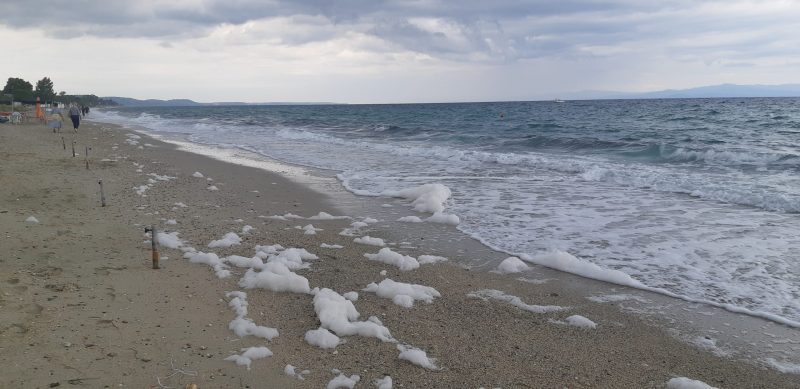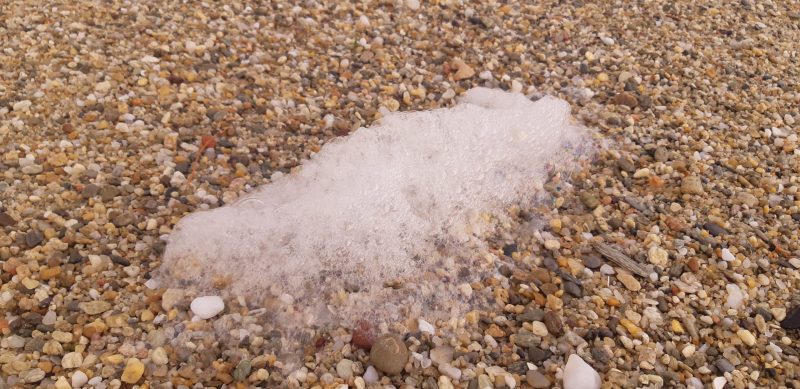Marine mucilage has been much more present than previous years
Originally published on Global Voices

Sea snot on a beach between Chaniotis (Hanioti) and Pefkochori, Chalkidiki, Greece in September 2021. Photo by Meta.mk, CC BY-NC.
This story is based on original coverage by Meta.mk. An edited version is republished here under a content-sharing agreement between Global Voices and Metamorphosis Foundation.
A slimy foam called sea snot, also known as marine mucilage, which results from global warming, has been appearing increasingly on Greek beaches during the summer of 2021. Photos of some of the beaches on the Chalkidiki (Halkidiki) peninsula this September show that the Aegean Sea indeed occasionally sprouts such organic foam.
Scientists relate the appearance of sea snot to global warming. The heating of the atmosphere under the greenhouse phenomenon increases the temperature of the oceans and the seas, making them more appropriate for certain microorganisms that thrive in warmer waters, while they also create an environment uninhabitable for other animals and plants.
Sea snot mostly consists of microscopic algae known as phytoplankton. While phytoplankton alone isn’t harmful to the environment, when mixed with rising water temperatures, wastewater, pesticides, and global warming, it flourishes and can reproduce at a harmfully rapid rate, affecting biodiversity, blocking sunlight from entering the water and reducing oxygen levels in the sea.
According to a report by the Poseidon System, a network of scientific-research stations supported by the state and European Union that monitor the Greeks seas, the marine heat wave in the second half of June 2021 increased the average daily temperature of the Aegean Sea to 28 degrees Celsius, which is a whole 4 degrees higher than previous years.
Local inhabitants in seaside town of Pefkochori who spoke to the Meta.mk team said that the folklore explanation for sea snot was that “grandmas say its just soap coming from cleaning of ships.” Locals are generally reluctant to discuss the topic of marine mucilage with foreigners.

Sea snot on a beach between Chaniotis and Pefkochori, Chalkidiki, Greece in September 2021. Photo by Meta.mk, CC BY-NC.
In June, the British newspaper Independent reported that the Greek government initiated an investigation of the sea snot outbreak in the waters near the island of Lemnos.
At the time, Greek newspaper Ekathimerini wrote that the phenomenon is caused by a nutrient overload in algae, resulting from pollution and high temperatures, and is being monitored by the Fisheries Research Institute on behalf of the Greek Environment Ministry.
In a statement for Ekathimerini, Stavros Stathakis, vice president of the association of fishermen on Limnos, warned that the sludge is hampering fishing and also putting off tourists:
It forms every so often but usually dissipates after a while. This is the first time in a decade we have seen so much.

Sea snot on a beach between Chaniotis and Pefkochori, Chalkidiki, Greece in September 2021. Photo by Meta.mk, CC BY-NC.
The increasing of the quantity and frequency of sea snot outbreaks indicates the consequences of climate change caused by humans, by the excretion of carbon dioxide into the atmosphere from the burning of fossil fuels (coal, oil, natural gas) and the depositing of waste into the water systems.
The outbreak of sea snot in the Aegean Sea has been much less impactful than the recent overflow of sea snot in the Marmara Sea in neighboring Turkey. As Global Voices reported in June, the Turkish authorities initiated inspections against suspected sources of the mucilage, as well as a massive cleanup effort. Turkish president Recep Tayyip Erdoğan blamed the sea snot bloom on people and companies dumping waste into the Marmara Sea.
Post a Comment